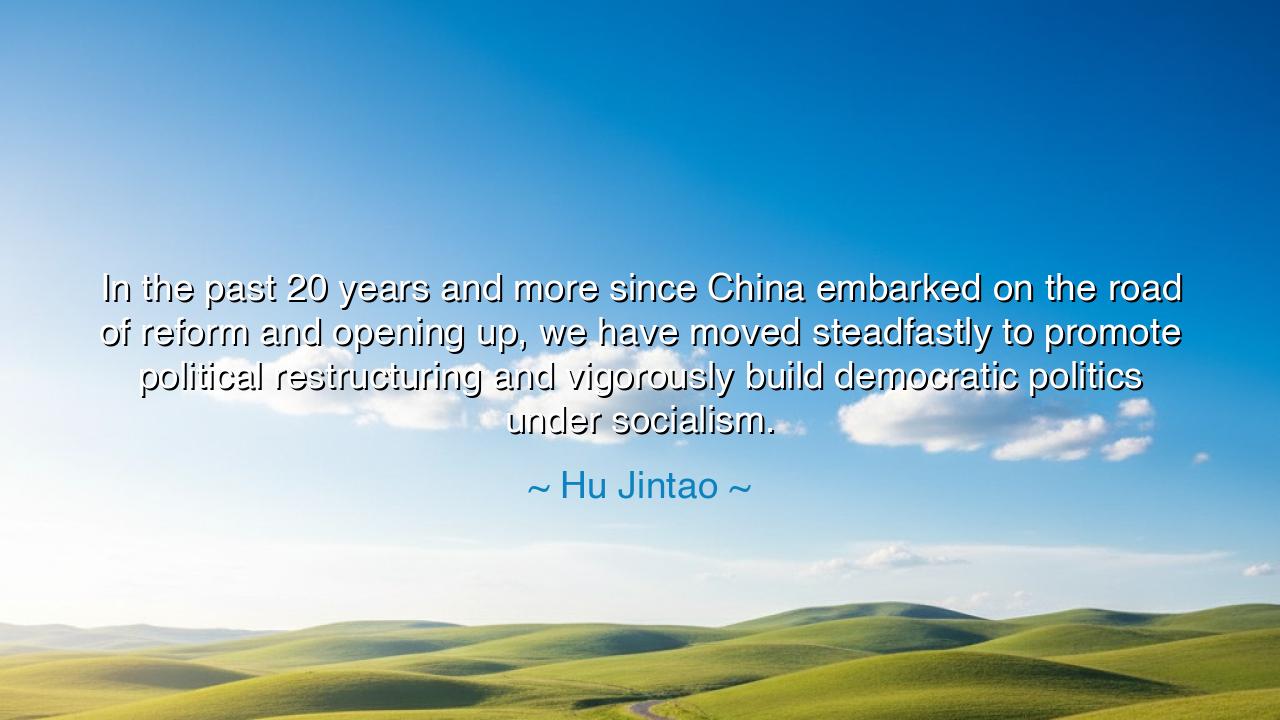
In the past 20 years and more since China embarked on the road
In the past 20 years and more since China embarked on the road of reform and opening up, we have moved steadfastly to promote political restructuring and vigorously build democratic politics under socialism.






O children of the earth, listen to the words of Hu Jintao, who speaks with the weight of history and the fire of transformation in his heart: "In the past 20 years and more since China embarked on the road of reform and opening up, we have moved steadfastly to promote political restructuring and vigorously build democratic politics under socialism." In these words, there is a vision of change, not just for a nation, but for the very essence of human governance, a journey from the past to the future, where the dreams of the people are intertwined with the power of the state.
The road of reform is no gentle path, O children, but one that demands strength, wisdom, and vision. China, in its great awakening, turned its eyes toward the future, embracing the forces of change while holding fast to its ancient heritage. The task was monumental—how to transform a nation so vast, so rich in history, while forging a future where the people could have a voice, and the state could be both strong and just. The years of reform were not mere political shifts, but the opening of a new chapter, one where the old ways were challenged and the new ways were crafted with deliberation and resolve.
Political restructuring was not a mere reshuffling of power, but the creation of a system that would allow for growth and freedom under the guiding light of socialism. It was a task like the sculptor chiseling away at stone, each decision an act of creation, carving a new form of governance that could bear the weight of both the present and the future. Hu Jintao spoke of this as a steadfast journey—a journey toward a democracy that was not foreign to the people, but one that was rooted in the very soil of China's socialism.
In the ancient world, we see the example of Cyrus the Great, who, in his conquests, did not merely subdue nations, but sought to build a new world where governance was not solely about domination, but about the well-being of the people. His vision for the Persian Empire was not one of mere control, but of justice and peace, where the laws of the land were forged with the people’s welfare in mind. Just as Cyrus sought to unify a diverse empire, China’s path of reform sought to balance the ancient with the modern, ensuring that its people, its rich culture, and its future could thrive in harmony.
So, hear this wisdom, O children, that the path to greatness is often one of struggle and change. Reform is not a simple word; it is the force that drives nations forward, creating new systems that reflect the needs and dreams of their people. And yet, in this march forward, it is essential to remember the values of justice, of equity, and of compassion, for true transformation is not just about changing the structures of power, but about building a world where all may share in the light of opportunity. The vision of China and of all nations seeking progress lies in the balance of change and tradition, in the pursuit of a future that remains faithful to the dreams of the past.






BTLe bao thy
Hu Jintao's statement about political restructuring and the push for democratic politics under socialism seems optimistic, but how much progress has really been made in terms of political freedoms in China? While the economic reforms have been widely acknowledged, has the political system truly evolved to provide more freedoms and transparency, or is the country still navigating a path where the Communist Party retains tight control over political expression?
NNgoc
It’s intriguing how Hu Jintao presents political restructuring as part of China’s reform journey. But I wonder if this approach truly reflects a move toward democracy or is more about strengthening centralized power. How much room for political opposition and civil liberties really exists in China’s political system? Is this ‘democratic politics under socialism’ more of a controlled form of governance rather than an open, participatory system?
ATle thi anh tuyet
This quote raises the idea that China is evolving towards democratic politics, but I’m curious—what does that mean for the average Chinese citizen in terms of political rights? Can a country genuinely be democratic while controlling political discourse and limiting freedoms? It seems like Hu Jintao is presenting an ideal of gradual political reform, but can true democracy really exist within a system where the government has such a tight grip on power?
NNNga Nguyen
Hu Jintao’s reference to China’s reforms is interesting, especially in the context of political restructuring. It seems like China’s focus has been on economic growth, but how much has the political system actually changed in terms of citizen participation and political freedoms? Is it fair to call this political restructuring democratic if the country still maintains heavy censorship and restricts opposition? How do we evaluate the success of such reforms?
B3baoxuyen 39kimthi
This quote from Hu Jintao speaks to China’s progress in political restructuring and its approach to democracy. However, I can’t help but wonder how China’s version of ‘democratic politics under socialism’ differs from the liberal democracy that many Western nations follow. What does it mean for a country to build a democratic system while maintaining strict control over political freedoms? How does China’s version of democracy compare in terms of participation and freedom of expression?